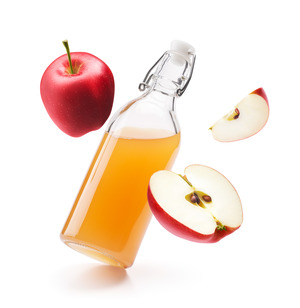
Many people see apple cider vinegar as an excellent home remedy that has all kinds of uses. Some say it can help relieve sunburn or treat issues like acid reflux. And when it comes to the teeth, there are even those who use it as a whitening option. But could apple cider vinegar really give you a brighter smile? Or could it actually lead to oral health problems? It’s best to learn the facts from your preventive dentist now before doing anything that could have serious consequences for your grin later.
What Effects Can Apple Cider Vinegar Have On Your Teeth?
When talking about the impact apple cider vinegar can have on your smile, there’s one important fact that you need to remember: it is highly acidic, having a pH rating of 2 to 3. As such, too much exposure to this liquid can wear away tooth enamel.
As strong as enamel is, it lacks living cells and can’t regenerate when it’s destroyed. Consequently, the erosion caused by apple cider vinegar will be permanent. Over time, your teeth will become more sensitive, causing discomfort when you eat particularly hot or cold foods. And as your enamel grows weaker, it will become more susceptible to decay – which means you’ll be much more likely to develop a cavity.
Can Apple Cider Vinegar Be Used to Whiten Teeth?
The acetic acids in apple cider vinegar do have bleaching properties, which means they could potentially be used to help remove dental stains. However, the damaging effects that apple cider vinegar can have on your enamel should not be overlooked. Having a whiter smile isn’t worth it if it means weakening your teeth and putting your oral health at risk. It’s better to talk to your dentist to see what professional options are recommended for addressing tooth stains in a safe way.
Is There Any Way to Protect Your Teeth While Using Apple Cider Vinegar?
If you still want to use apple cider vinegar as a home remedy, there are a few steps you can take to mitigate the harmful effects it can have on the teeth:
- Dilute the vinegar by mixing it with warm water. Ideally, the solution should have two or three parts water while only having one part vinegar.
- Don’t swish the vinegar around in your mouth for more than 20-second intervals.
- Once you’re done using the vinegar, brush your teeth thoroughly and drink some water to rinse away any lingering acids.
Even with the precautions listed above, it’s best not to use apple cider vinegar until you’ve spoken with your dentist first. A professional’s opinion can help you make decisions that are truly right for your smile.
About the Author
Dr. Steven Crovatto earned his Doctor of Dental Medicine at the University of Florida. In the past, he has served as the president of the Clay County Dental Society. At Crovatto & Edwards Family Dentistry, he offers different kinds of cosmetic dentistry (including teeth whitening) as well as compassionate preventive care. If you would like to set up a consultation with Dr. Crovatto at his Orange Park office, visit his website or call (904) 272-0800.
